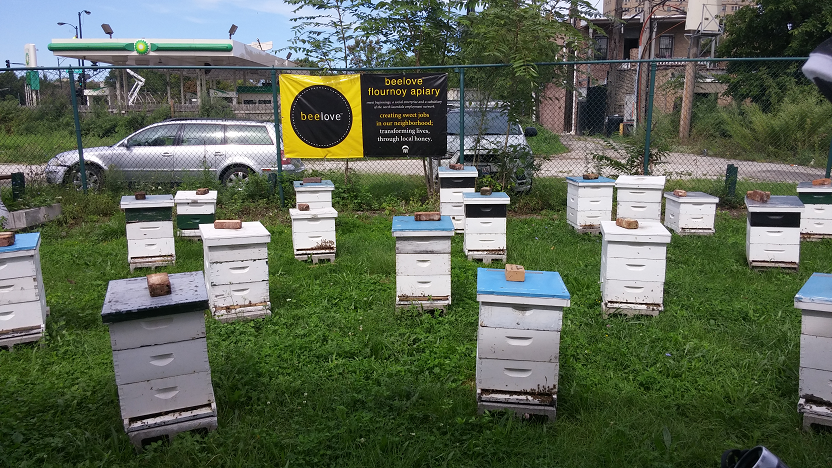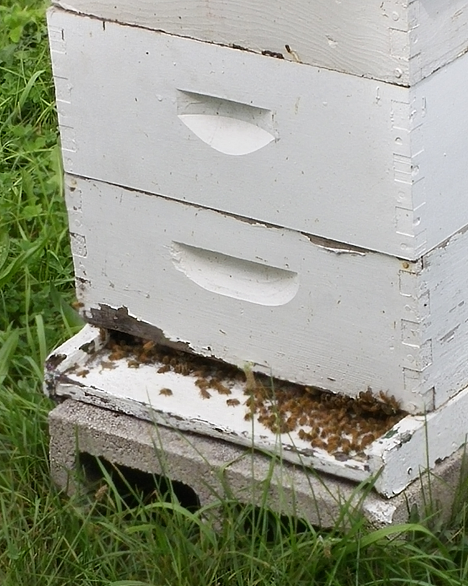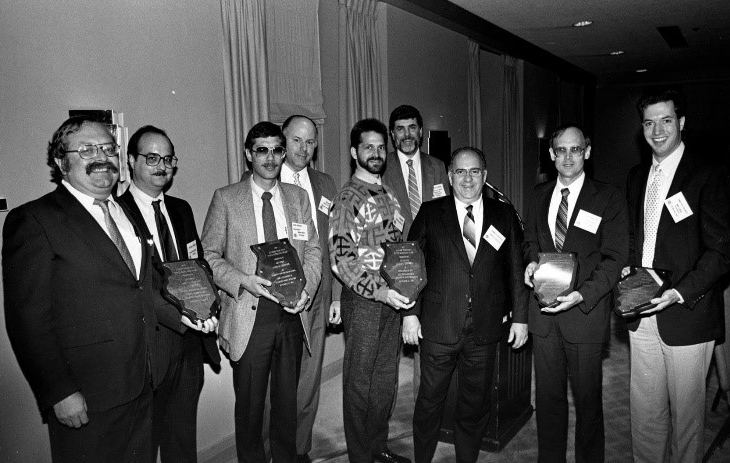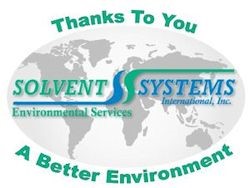 Hidden behind a gas station off of I290 in the North Lawndale neighborhood, the North Lawndale Employment Network (NLEN) resides. Inside this former duplex lies a bustling employment and training center, natural skin care products and honey production facility, and about 20 bee hives in the backyard. It might look a little odd, but this is where new, sweet beginnings are launched, and formerly incarcerated people that want to change their lives around can, without judgement. This is the home of Sweet Beginnings, 2014 winner of the Illinois Governor’s Sustainability Award.
Hidden behind a gas station off of I290 in the North Lawndale neighborhood, the North Lawndale Employment Network (NLEN) resides. Inside this former duplex lies a bustling employment and training center, natural skin care products and honey production facility, and about 20 bee hives in the backyard. It might look a little odd, but this is where new, sweet beginnings are launched, and formerly incarcerated people that want to change their lives around can, without judgement. This is the home of Sweet Beginnings, 2014 winner of the Illinois Governor’s Sustainability Award.
Sweet Beginnings began with NLEN’s founder and CEO, Benda Palms-Barber. Through NLEN, they had developed a four-week training program for formerly incarcerated citizens that want to get into, or back into, the workforce called the U-Turn Permitted program. Once the participants had completed this job-readiness program, they were having difficulty finding work. Ms. Palms-Barber decided that something needed to be done to bridge this gap. “I felt responsible for these people that really wanted to turn their lives around and find work. Employers sometimes just won’t hire someone with a background, even after going through our U-Turn Permitted program, and it is incredibly frustrating,” Ms. Palms-Barber notes. She knew that she had to get creative.
 After many ideas and much frustration of trying to develop a program or business that could provide real work experience for those with little to no experience or education, Ms. Palms-Barber thought of something unique – bee keeping. The care and process of bee keeping is through storytelling, and taking care of hives and producing products develop real-world work skills and practice. She didn’t know that building apiaries was going to be her path until she spoke with one colleague who said – “Wouldn’t that be a sweet beginning?”
After many ideas and much frustration of trying to develop a program or business that could provide real work experience for those with little to no experience or education, Ms. Palms-Barber thought of something unique – bee keeping. The care and process of bee keeping is through storytelling, and taking care of hives and producing products develop real-world work skills and practice. She didn’t know that building apiaries was going to be her path until she spoke with one colleague who said – “Wouldn’t that be a sweet beginning?”
Now, Sweet Beginnings trains over 60 formerly incarcerated individuals per year with significant barriers to employment in a sustainable industry that also help important pollinators, bees thrive in a time of great decline. In turn, they produce locally-made, delicious and moisturizing products. The recidivism rate for former Sweet Beginnings employees is now below 4%, compared to a national average of 65%. Participating individuals have found jobs in manufacturing, food service, distribution, hospitality, customer service and more. Employers like the Chicago Transit Authority, and local businesses, regularly hire graduates of the Sweet Beginnings program. Additionally, after 10 years of operation, they have finally become a profitable enterprise.
Sweet Beginnings not only helps our environment be more sustainable by helping support pollinators, but they also help sustain their local neighborhood and provide rare opportunities to have a sweet, new beginning at life. I believe the founder and CEO of NLEN, Brenda Palms-Barber said it best: “Who would have thought that something so sweet is coming out of the North Lawndale area?”
You can find their Beelove products in the Chicagoland area through places like Marianos, Whole Foods, and at Hudson News at O’Hare and Midway airports.
Also – we will have a video coming out on our YouTube Channel about Sweet Beginnings shortly!
More information on Beelove products: http://www.sweetbeginningsllc.com/
More information on the North Lawndale Employment Network: http://www.nlen.org/
 This year not only marks ISTC’s 30th anniversary, it is also the 25th anniversary of the Pollution Prevention Act. Pollution Prevention (P2) Week, celebrated during the third week of September each year (September 21-27, 2015), highlights the efforts of EPA, its state partners, industry, and the public in preventing pollution right from the start.
This year not only marks ISTC’s 30th anniversary, it is also the 25th anniversary of the Pollution Prevention Act. Pollution Prevention (P2) Week, celebrated during the third week of September each year (September 21-27, 2015), highlights the efforts of EPA, its state partners, industry, and the public in preventing pollution right from the start.




 ISTC will be at Urbana’s Market at the Square in the community groups section discussing proper medicine disposal and our research on
ISTC will be at Urbana’s Market at the Square in the community groups section discussing proper medicine disposal and our research on 

 ISTC will participate next week in the U of I’s Institute for Sustainability, Energy, and Environment (iSEE) second annual international conference titled “Water Planet, Water Crises? Meeting the World’s Water-Food-Energy Needs Sustainably”. The
ISTC will participate next week in the U of I’s Institute for Sustainability, Energy, and Environment (iSEE) second annual international conference titled “Water Planet, Water Crises? Meeting the World’s Water-Food-Energy Needs Sustainably”. The